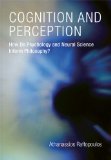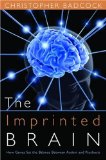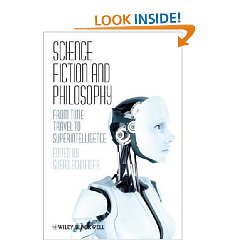August 21, 2009
Cognition and Perception: How Do Psychology and Neural Science Inform Philosophy? (Bradford Books) by Athanassios Raftopoulos (MIT Press, 2009)
(link for UK)
Product description from the publisher:
In Cognition and Perception, Athanassios Raftopoulos discusses the cognitive penetrability of perception and claims that there is a part of visual processes (which he calls “perception”) that results in representational states with nonconceptual content; that is, a part that retrieves information from visual scenes in conceptually unmediated, “bottom-up,” theory-neutral ways. Raftopoulos applies this insight to problems in philosophy of science, philosophy of mind, and epistemology, and examines how we access the external world through our perception as well as what we can know of that world.
To show that there is a theory-neutral part of existence, Raftopoulos turns to cognitive science and argues that there is substantial scientific evidence. He then claims that perception induces representational states with nonconceptual content and examines the nature of the nonconceptual content. The nonconceptual information retrieved, he argues, does not allow the identification or recognition of an object but only its individuation as a discrete persistent object with certain spatiotemporal properties and other features. Object individuation, however, suffices to determine the referents of perceptual demonstratives. Raftopoulos defends his account in the context of current discussions on the issue of the theory-ladenness of perception (namely the Fodor-Churchland debate), and then discusses the repercussions of his thesis for problems in the philosophy of science. Finally, Raftopoulos claims that there is a minimal form of realism that is defensible. This minimal realism holds that objects, their spatiotemporal properties, and such features as shape, orientation, and motion are real, mind-independent properties in the world.
Table of contents & sample chapters available at MIT Press
Comments (0)
- cognitive science,new books,philosophy of mind
July 21, 2009
Alternate Minds: Cognitive Science Fiction and Philosophy is a cool new blog from Pete Mandik, who describes its aim:
…to explore science fictional permutations of the concept of mind (and related concepts such as intelligence, perception, selfhood). By entertaining speculative scenarios wherein the target concepts are bent almost beyond recognition, we gain insights into the nature of mind and catch glimpses of new possibilities. Initial investigations will be clustered around seven key themes: Virtual Minds, Infinite Minds, Group Minds, Time-traveling Minds, Hyper-spatial Minds, Quantum Minds, and Anti-Minds.
Comments (0)
- cognitive science,fiction,philosophy of mind
June 13, 2009

The Imprinted Brain: How Genes Set the Balance of the Mind Between Autism and Psychosis by Christopher Badcock (Jessica Kingsley Publishers, 2009)
Product description from the publisher:
“The Imprinted Brain” sets out a radical new theory of the mind and mental illness based on the recent discovery of genomic imprinting. Imprinted genes are those from one parent that, in that parent’s interest, are expressed in an offspring rather than the diametrically opposed genes from the other parent. For example, a higher birth weight may represent the dominance of the father’s genes in leading to a healthy child, whereas a lower birth weight is beneficial to the mother’s immediate wellbeing, and the imprint of the mother’s genes will result in a smaller baby. According to this view, a win for the father’s genes may result in autism, whereas one for the mother’s may result in psychosis. A state of equilibrium – normality – is the most likely outcome, with a no-win situation of balanced expression. Imprinted genes typically produce symptoms that are opposites of each other, and the author uses psychiatric case material to show how many of the symptoms of psychosis can be shown to be the mental mirror-images of those of autism. Combining psychiatry with insights from modern genetics and cognitive science, Christopher Badcock explains the fascinating imprinted brain theory to the reader in a thorough but accessible way. This new theory casts some intriguing new light on other topics as diverse as the nature of genius, the appeal of detective fiction, and the successes – and failures – of psychoanalysis. This thought-provoking book is a must-read for anyone with an interest in autism, psychiatry, cognitive science or psychology in general.
See also: “Imprinted Brain Theory” at Edge
Comments (0)
- cognitive science,consciousness,new books,philosophy of mind
June 7, 2009

Two of my favorite realms of reading meet in Science Fiction and Philosophy: From Time Travel to Superintelligence ed. by Susan Schneider (Wiley-Blackwell, 2009). A “look inside” at the table of contents shows a lineup of authors that includes Daniel Dennett, David Chalmers, Andy Clark, Derek Parfit, David Lewis, and Ray Kurzweil.
Product description from the publisher:
A timely volume that uses science fiction as a springboard to meaningful philosophical discussions, especially at points of contact between science fiction and new scientific developments.
* Raises questions and examines timely themes concerning the nature of the mind, time travel, artificial intelligence, neural enhancement, free will, the nature of persons, transhumanism, virtual reality, and neuroethics
* Draws on a broad range of books, films and television series, including The Matrix, Star Trek, Blade Runner, Frankenstein, Brave New World, The Time Machine, and Back to the Future
* Considers the classic philosophical puzzles that appeal to the general reader, while also exploring new topics of interest to the more seasoned academic
Comments (0)
- fiction,new books,philosophy of mind






